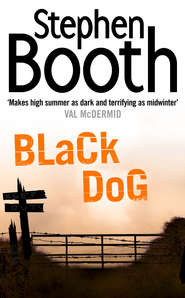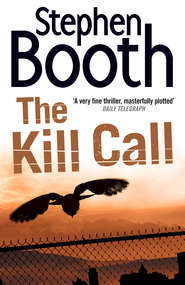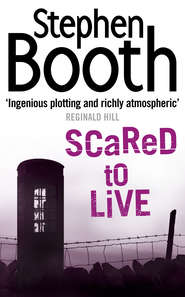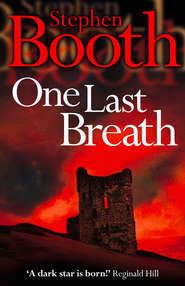По всем вопросам обращайтесь на: info@litportal.ru
(©) 2003-2024.
✖
Cooper and Fry Crime Fiction Series Books 1-3: Black Dog, Dancing With the Virgins, Blood on the Tongue
Автор
Год написания книги
2018
Настройки чтения
Размер шрифта
Высота строк
Поля
In the corridor, DI Hitchens called them back.
‘I’ll be out for another briefing and to take your reports myself at the end of the morning,’ he said. ‘There’s a pub in Moorhay, isn’t there, Cooper?’
‘The Drover, sir.’
‘Marston’s, I seemed to notice when we went through the village yesterday.’
‘That’s right.’
‘We’ll rendezvous there then – let’s say twelve-thirty. And Ben …’
‘Yes, sir?’
‘Don’t be late, will you?’
‘Sorry about that, sir. Family problems.’
‘It’s not like you. Don’t make a habit of it.’
‘No, sir.’
‘One more thing everybody needs to know. Mr Tailby pointed out how important these first few hours of an enquiry are. We all know that. But don’t get too carried away when your shift is finished. There’s no more overtime.’
‘What?’
‘There’s no cash in the budget. The top floor think we can get a result without it.’
‘It’s crazy,’ said Cooper.
Hitchens shrugged. ‘That’s the way it is. OK, you know what your tasks are. Off you go.’
Cooper and Fry had reached the car park at the back of the police station before they hesitated. Fry thought she could read his thoughts.
‘My car’s over there,’ she said. ‘The black Peugeot. And I’m a good driver.’
‘My Toyota’s got four-wheel drive,’ said Ben. ‘It might be handy for some of those lanes round Moorhay. And I know the way.’
Fry shrugged, allowing a small victory. ‘OK.’
They found little to say to each other on the drive out of Edendale. Cooper took a route that Fry didn’t know, dodging down narrow back streets that wound their way across town past the parish church and Edendale Community School. When they emerged on the Buxton Road, she realized that he had managed to bypass all the traffic snarled up on Clappergate and the other approaches to the town centre. Already, she thought, he was making a point of showing off his famous local knowledge.
Cooper could barely keep his eyes off the landscape as he drove. It was a constant pleasure to him to escape from Edendale into the surrounding hills, where the changing moods of the scenery always surprised and delighted him.
Nowhere was the contrast between the White Peak and the Dark Peak more striking than on the climb southwards out of Edendale, past the last of the housing developments, past the sports field and the religious retreat run by the Sisters of Our Lady. Right at the top of the hill was a pub, the Light House, with its stunning views across both limestone and millstone grit.
The patchwork of farmland and tree-covered slopes to the south looked welcoming and approachable lit by the sun, but was full of hidden depths and unseen corners. It was criss-crossed by a pattern of white dry-stone walls and it erupted here and there in steep limestone cliffs or the ripples and pockmarks of abandoned mine workings. It was, above all, a human landscape, settled and shaped by people, and still a place where thousands of years of history might be expected to come to the surface, if you cared to look.
Behind the car, to the north, the moors of the Dark Peak looked remote and forbidding, an uncompromising landscape that was anything but human. The bare faces of hardened gritstone seemed to absorb the sun instead of reflecting it as the limestone did. They seemed to stand aloof and brooding, untouched by humanity and therefore offering a challenge that many took up, to conquer their peaks. Some succeeded, but many failed, defeated by the implacability of the dark slopes and the bad weather that seemed to hover around them.
But appearances could be deceptive. Even the White Peak bore its scars – the great crude gashes where the limestone quarries and opencast workings had been blasted and ripped from its hills.
‘What do you think of Edendale, then?’ he asked at last, as they joined a convoy of cars crawling behind a caravan round the bends that climbed towards the summit of the hill. It promised to be another hot day, and their visors were down against the sun already scorching the windscreen and glaring off the tarmac. To their right, the outskirts of the town were gradually falling away, the stone slates of the roofs settling among the trees and petering out along the faint silver ribbon of the River Eden. There was a camping site in a meadow by the river just outside town, with rows of blue and green tents like exotic plants blooming in the morning sun. ‘That’s what everybody asks me,’ said Fry. ‘What do I think of Edendale. Does it matter?’
‘I would have thought so,’ said Cooper, surprised.
‘It’s a place to work. It has crime, like any other place, I suppose. I expect it has a few villains, a lot of sad cases and a whole mass of boring respectable types in between. It’s the same everywhere.’
‘It’s a better place to live than Birmingham, surely?’
‘Why?’
‘Well –’ He gestured with one hand off the steering wheel, indicating the hills and the valley and the river and the patchwork of fields and dry-stone walls, the tumbling roofs and spires of the town behind them, and the deep green mass of the Eden Forest marching up towards the vast reservoirs on the heights of the gritstone moors. He hardly knew how to express what he meant, if she couldn’t see it for herself.
‘In any case, I didn’t live in Birmingham,’ said Fry. ‘I lived at Warley.’
‘Where’s that?’
‘In the Black Country. Have you heard of it?’
‘I once travelled into Birmingham by train. That went through Wolverhampton. Is that close?’
‘Yeah, well, you’d know all about it then.’
They had reached a level stretch of road at the top of the hill, and Cooper accelerated to follow the stream of cars overtaking the caravan.
‘So if you liked the Black Country, what brought you here, then?’
Fry grimaced and turned her face away to look at the view across the plateau towards the Wye Valley, where Moorhay waited. But Cooper didn’t miss the gesture.
‘I suppose everybody asks you that as well.’
‘I suppose they do.’
‘Oh well,’ he said. ‘Nice to have you on board, anyway, Diane.’
Fry had charge of the file Hitchens had given them. She pulled out the map to avoid having to look at Cooper.
‘There’s only Main Street running through the village, and a few lanes off it. Some without names that only seem to lead to farms. And there’s a group of houses that seem to be called Quith Holes. Do you know it?’
‘Those cottages at Quith Holes back on to the Baulk,’ he said. ‘Not far from where Laura Vernon was found. There’s the Old Mill there too. It does teas and bed and breakfast now.’
‘Who doesn’t round here?’ said Fry as they passed another farmhouse advertising holiday accommodation.
She had to admit that Ben Cooper was a competent driver. She felt able to concentrate on absorbing the details from the file before they arrived at Moorhay. There was a photograph of Laura Vernon as she had been in life, though her hair was a different colour from that of the dead girl Fry had seen – not quite so virulent a shade of red. The photo had been blown up from one supplied by the Vernons on the day their daughter had gone missing. Fry had seen the original picture in the action file, before the case had become a murder enquiry and had been removed from the CID room. The full shot had shown young Laura in a garden, with a clump of rhododendrons in full bloom behind her, a glimpse of a stone balustrade and the top of a flight of steps to one side, and a black and white Border collie asleep on the grass at her feet. But the enlargement showed only her head and the top half of her body. The background had been cut out, removing Laura from her environment as effectively as someone had removed her from life.
There was a list of the names and addresses of all Laura Vernon’s known contacts in Moorhay and the surrounding area. It was a pitifully short list for a fifteen-year-old girl. Top of it was Lee Sherratt, aged twenty, of 12, Wye Close, Moorhay. He had worked as a gardener at the Mount until dismissed from his job last Thursday by Laura’s father, Graham Vernon. Sherratt had been interviewed when Laura was first reported missing, but had not been seen since Sunday. Unlike the Vernons, the Sherratts had not reported their son missing. His name was marked in red, which meant tracing him was a priority.
Further down the list were Andrew and Margaret Milner and their daughter Helen. Andrew was also noted as an employee of Graham Vernon’s. As for Helen, Fry remembered her from her visit to Dial Cottage with Tailby and Hitchens. She had stayed close to the old man when the police had arrived – closer than his own wife, it had seemed. Close relationships within families always seemed a bit suspect to Diane Fry; she felt she didn’t quite understand them.











